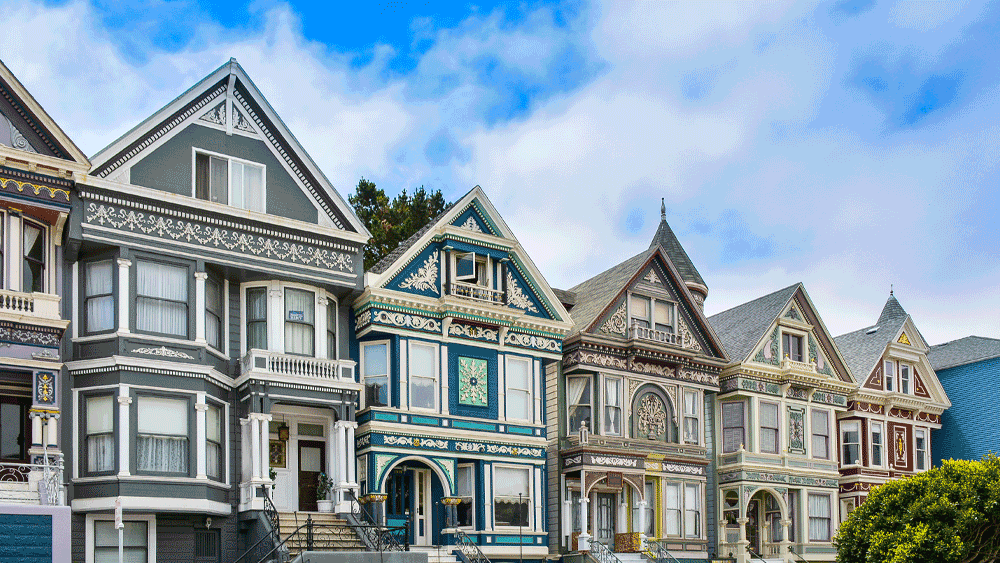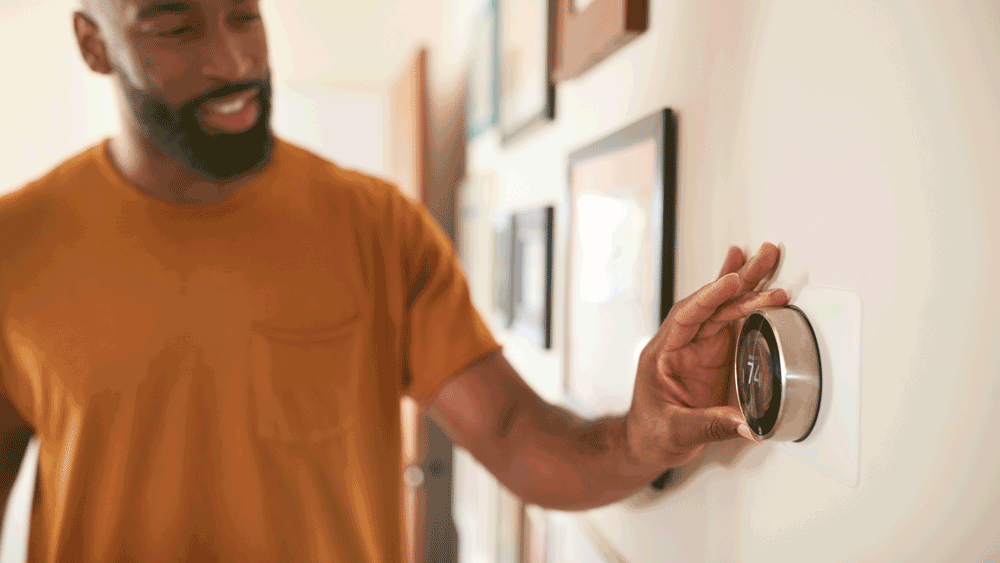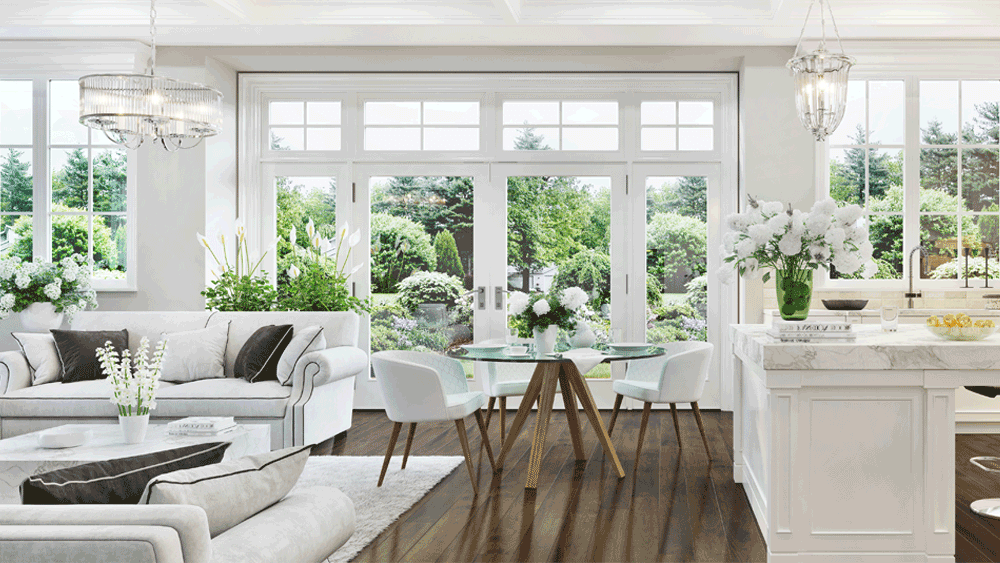In today’s turbulent economy, many homeowners are searching for ways to save money. One of the most effective and popular ways is to save on energy costs by installing new energy efficient windows and doors.
Replacing old windows with new, energy efficient models is generally considered the most cost-effective way to achieve energy savings. It might be surprising to learn that old windows are largely responsible for radiant heat and drafts that inflate energy use. Because we can’t see the energy escaping, we often don’t notice.
Replacement windows usually earn a significant return on investment, or ROI, because they conserve energy, improve livability, and increase home value. Few home improvements offer more ways to benefit than installing new energy efficient windows.
Here we will discuss a number of ways replacing your windows can provide an excellent return on investment, while saving you money every month on your energy costs. In many cases, the increase in home value alone can financially justify a window replacement project.
Repair vs. Replace Your Windows: Do I Need New Windows?
In today’s modern world of window technology, repairing an older window instead of replacing it is usually a poor choice. Older windows are not built for modern energy standards, so regardless of how well they are maintained or repaired, they are not energy efficient.
Repairing Windows: Pros and Cons

● Pros:
There is really only one pro to investing money into repairing older windows, and that is for historical value. Often, local jurisdictions prevent updating historical structures to today’s energy standards for cosmetic and historical reasons.
● Cons:
Money invested in old window repairs is money that could be used to purchase windows that can actually pay for themselves. Old, worn-out windows have lived their intended lifespan, so repairing them is usually a last resort.
Replacement Windows: Pros and Cons
● Pros:
The benefits of replacing older windows with new, energy efficient windows include a nearly immediate return on investment, increase in home equity, and better curb appeal. Those planning to stay in a home will benefit from the accrued energy savings, while home buyers will enjoy the savings for years to come without making the initial investment.
● Cons:
The only downside to replacing your windows versus repairing them is the upfront cost.
Upscale windows, like these made by Marvin, set the standard and have not been available previously. Most older-style single pane and storm windows do not impede the heat or ultraviolet radiation from the sun. In most cases, this leads to unnecessary energy usage because the HVAC system has to overcome the additional heat entering the home.
New and replacement windows solve much of this problem by using energy efficient frames and glass (also known as glazing), in addition to expert installation. The modern design of these windows is at the heart of saving money by reducing energy use. Many include Bluetooth® technology, which allows monitoring of the window from anywhere in the world.
Why Should I Invest in New Windows?
Investing in new or replacement windows is a great way to add value, lower energy bills, and add curb appeal to your home. Few home renovations benefit the homeowner as much as replacing windows, when the increases in home value, comfort, and curb appeal are considered.
New Windows Increase Home Value
- Most savvy home buyers understand the value of replacement windows and will generally add their value to a purchase offer. Even if the buyer’s offer isn’t increased by the windows, selling your home is made easier. Especially if the competition has not made the investment, your home will have an advantage.
- Curb appeal is critical to selling your home and few projects improve curb appeal like new windows. In fact, in top 10 lists ranking which home improvements offer the best ROI, replacement windows are always near the top.
Energy Savings

- Installing new windows can often pay for themselves in a relatively short time. Most modern windows include low-e glass, which indicates the window allows very little energy to pass through the glazing.
Some home designs have more windows than others. These designs benefit the most from energy efficient windows because the savings are cumulative. The more windows you replace, the greater the savings.
Homeowners also reap the energy savings while they own the home and still pass the benefits on to a future buyer. Most real estate agents agree that selling your home is often easier when you can demonstrate the cost savings on your energy bill.
Enjoyment
- Although we may not be able to quantify enjoyment, new windows tend to make a home more enjoyable to live in. You get to enjoy the clear view, easy operation, and energy savings while you own the home, and still collect for their value when selling it.
How Much Do New Windows Cost?
Both new windows and replacement windows will be priced based on the size, functionality, and brand. Consumers know that Marvin is a top-branded window manufacturer, so they know quality is built in. Glass size, type, and window style will be the other key differences that affect the total price.
In the land of Marvin, Casements and Double Hungs are about the same price. But in general, Casement windows usually cost a bit more than double hung windows.
Casement windows use sophisticated mechanisms to operate the window, while double hung windows are much simpler in design. Stationary windows that do not open will usually be less expensive than a similar sliding, double hung, or casement version because no opening hardware is required.
Energy Rebates
Because California grew so quickly, many homes were constructed during the 1950s and 1960s. Energy efficient windows had not been invented yet, so many homes today still have energy-wasting windows.
Several California utility providers offer rebates to buyers investing in energy-saving window replacement. The Los Angeles Department of Water and Power (LADWP),for example, makes energy saving rebates available for qualifying energy efficient windows. The rebates are calculated by the square foot, so the more windows you buy, the larger the rebate.
How Long Should New Windows Last?
Most modern replacement and new construction windows come with a 20-year warranty or longer. Modern manufacturing techniques make this possible by eliminating many of the reasons windows can fail.
New windows are available in a number of low maintenance, high durability materials like vinyl, wood clad, and fiberglass. Many older windows have uninsulated wooden frames that pale by comparison to the durable, energy efficient window materials used today.
How Long Does It Take To Install New Windows?
The project length will depend on how many windows you are replacing. Most standard size homes are about 2000 square feet and contain 10 to 12 windows. These window replacement projects can be completed in about a week, but very large projects may take longer. Professional installation is critical, so you want the job done by an authorized installer.
How Do I Know if I Need New Windows?
Older windows will often show signs they are in distress. Here are a few telltale signs your windows need replacing:
- Windows are Foggy
When older, dual-paned windows fog up and you can’t wipe it off, the seal between the panes of glass has failed and allowed moist air between the panes. As a result, the window permanently fogs up.
- Loud Exterior Noise
If you live near a street with heavy traffic or have noisy neighbors, you’ll love the difference new windows can make in dampening exterior noise. The same technology that keeps your windows well sealed from uncomfortable temperatures also helps reduce sound transmission.
- Drafts
Windows approaching the end of their lifespan tend to allow drafts because the panes are no longer sealing against each other, or the frame. Windows depend on these seals to prevent air and water leaks. If they fail, window dressings tend to sway for no reason and drafts can be felt around the window.
- Your Windows are Old
Contrary to popular belief, windows (and doors) have a finite operational lifespan. Today’s modern windows last far longer than windows built just two decades ago. If your windows are more than 20 years old, the energy savings achieved with new windows is significant, not to mention the additional curb appeal.
How Much Do New Windows Increase Home Value?

Generally, most replacement window projects earn about 80% of the cost to install them at resale time. Obviously, the actual return on your investment may vary, but most projects can expect about an 80% ROI.
Exceptions might include homes that emphasize windows in the design. Large, impressive entrances and large, south-facing windows can return even more of the investment for the right buyer.
When investing in south-facing windows, always select the most energy efficient glass the budget allows. Doing so is literally money in the bank, because south-facing windows receive the most sunlight and heat. Investing in high quality, energy-saving replacement windows saves not only energy, but avoids faded furniture and carpets damaged by UV radiation.
Ready To Invest In New Windows?
Designer Window Supply offers a huge selection of Marvin energy efficient windows for virtually any application. To see what options are available, request a free design appointment. A replacement window expert will assess your windows and provide a clear, honest opinion of the next steps.

